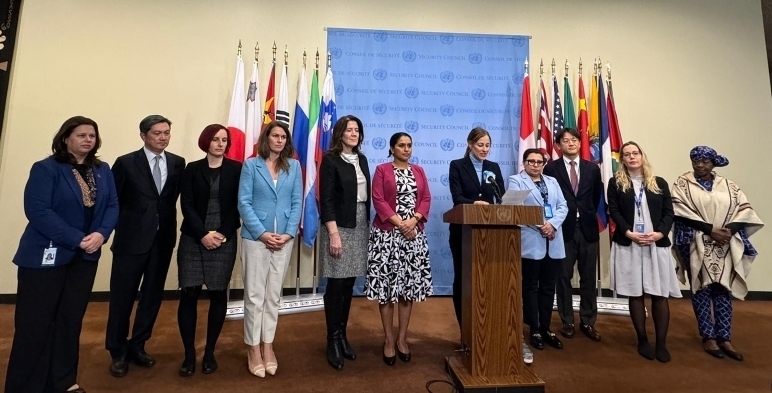Joint Press Stakeout on behalf of the signatories to the Women, Peace and Security (WPS) Shared Commitments on the Security Council Briefing on Colombia
2024/10/15

SC/WPS-SCH/1011/CHE
Joint Press Stake-Out Statement by the Security Council signatories of the Statement of Shared Commitments for the Principles of Women, Peace and Security
Security Council meeting on Colombia
As signatories of the Shared Commitments on Women, Peace and Security (WPS) we[1] believe in the transformative power of the WPS agenda to enable the Security Council to maintain international peace and security. We have committed to advancing and heightening the visibility of our discussions on Women, Peace and Security. Today we focus on Colombia.
We commend Colombia’s visionary 2016 Peace Agreement, which places survivors at the heart of its efforts and mainstreams gender by integrating more than 100 gender provisions throughout the Final Peace Agreement.
During a visit of the Security Council to Colombia in February of this year, we were able to engage meaningfully with former combatants, victim representatives, women's organizations, indigenous and Afro-Colombian communities to discuss the progress made and remaining obstacles in the comprehensive implementation of the peace agreement. And what we have witnessed over and over again, was the urgent call for improved security guarantees, equitable land distribution, and the successful social, political, and economic reintegration of former combatants as well as the crucial implementation of gender provisions and the ethnic chapter of the Peace Agreement.
We express our grave concern over continued violence, including sexual and gender-based violence (SGBV), against all women in diverse situations and conditions, including women peacebuilders, human rights and environmental defenders, social leaders, and former combatants. This must end now. We therefore call for the full and swift implementation of the gender-related provisions of the 2016 Peace Agreement, as well as the Comprehensive Programme of Safeguards for Women Leaders and Human Rights Defenders and the Comprehensive Reintegration Programme, to facilitate their safe participation in the Colombian peace process. We also welcome the opening of Macro Case 11 by the Special Jurisdiction for Peace which aims to address the root causes of gender-based violence and represents an important step towards ending impunity.
Let us be clear, the profound impact of women’s increased political participation in Colombia’s peace process is undeniable, having led to significant achievements such as broadening the understanding of human security in peacebuilding. We commend these initiatives led by women and women’s organizations, and eagerly await the prompt publication and implementation of Colombia’s first National Action Plan on Women, Peace and Security, which saw active engagement of more than 1,500 women in different regional and thematic forums. Moreover, we welcome the recent election of the first female Ombudsperson to defend human rights and advocate for peace in Colombia. And we look forward to Colombia’s hosting of the Prevention of Sexual Violence in Conflict Initiative in November.
We further call on the UN Verification Mission in Colombia to continue to integrate its gender perspective across all pillars of its work. Additionally, civil society, particularly women's organizations, play a critical role in building sustainable peace and must be protected from any reprisals for their engagement in peace efforts and their cooperation with the UN. To this end, the Security Council needs to prioritize the WPS agenda in the work with Colombia. We will continue to advocate for the integration of strong WPS language in all relevant Council products and resolutions, including the UNVMC mandate renewal.
As women peacebuilders reminded us during the Security Council's visit in Colombia, lessons learned from previous peacebuilding efforts, such as including women at the negotiating table, including them in decision-making processes and involving them meaningfully in shaping implementation, is paramount. Together, in the spirit of collaboration, we can make progress in implementing the visionary objectives on WPS set out in the 2016 Peace Agreement.
[1] Ecuador, France, Guyana, Japan, Malta, Republic of Korea, Sierra Leone, Slovenia, the United Kingdom and the United States of America and Switzerland
